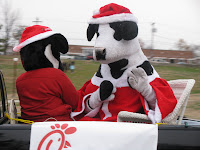Over most of my adult life in faith, I’ve been fortunate to go to churches small enough to still take one of the Sundays in Advent for the Christmas Pageant, though the word pageant always brings a smile to my face. I can’t help but wonder which of the magi will win the gown competition and if any of the shepherds will do something other than shear a sheep for their talent. Vocabulary aside, something about the parade of bath-robed shepherds helps Jesus to be born anew year after year.
The first year Ginger was in Winchester, she had a number of the young people taking part. One of the girls, who had not grown up in church, asked to be King Herod. As the rehearsal continued and came to her scene, she broke character in the middle of her speech and said, “Wait a minute! Herod’s a bad guy.”
My favorite moment in Marshfield each year came when the angels appeared to the shepherds. The pulpit at the church was a wall of wood across the front, creating a ministerial fortress of solitude behind it. The angels, always some of our youngest and most enthusiastic participants, would jump up from behind the wall holding stars above their heads, their faces beaming, as we all sang, “Joy to the World.”
The pageant here in Durham is an Advent one, which, I’ve learned, means everyone shows up except Jesus. We had shepherds and angels and the star and the wise men who all gathered around Joseph and Mary, but she was still pregnant when we headed out for coffee hour. The days have not yet been accomplished; we still have to wait for Jesus.
I thought about our pageant several times yesterday and today as I have been with my father-in-law who has Alzheimer’s. I thought about it because I feel like one of those little towel-headed kids, all dressed up for the big event and all I’m doing is waiting. Ginger and my mother-in-law spent a couple of days together and I was with Reuben, who is to the core of his being one of the most gentle and hopeful people I know. In other years, we would have spent the drive talking about what he saw on the news, which he watched voraciously, or he would have asked me questions about my job and about Durham. Instead, he wondered if it was going to snow (because he thinks we still live in Boston) and asked about every thirty minutes what time Ginger and Rachel were going to come home. Today, I looked in his face as he sat across from me at lunch and his eyes looked vacant, as though he were fading like a face in an old photograph, except it was happening right in front of me.
As we drove yesterday, I was also waiting for word on my brother’s surgery to remove a tumor from his spinal cord. About ten o’clock last night I got news that was about as good as it could get: they were able to repair the disc, remove the tumor, and all indications were the tumor was benign (we’ll have to wait a couple of days for the official pathology report). More than one person said it was “an answer to prayer. God is good.”
It was and God is. I prayed the tumor would not be cancer, and that it would be as uncomplicated at surgery on one’s spinal cord can be. And I also prayed that Reuben wouldn’t get Alzheimer’s and that he wouldn’t disappear as quickly as he is. My brother is going to get to go on with life relatively unscathed – at least from this and my father-in-law is going to continue to lose his life incrementally. Holding both of them in my heart, I’m hesitant to say God showed up somehow and healed Miller because then I’m left with Reuben not being so fortunate.
When we finally do put a baby in the manger, we will sing
Christ, the highest heaven adored
Christ the everlasting Lord
Light and life to all he brings
Risen with healing in his wings
The last phrase always gets me: with healing in his wings. Both the beauty and mystery stir my heart. I love those words and I’m not sure what they mean; I only know they touch me at a place of deep yearning and hope. Run a Google search for the phrase and you’ll find it means a lot of different things to different people. When I look at the person the baby grew to be, the healing wings he sprouted have as much or more to do with the grace and forgiveness he showed people like Zacchaeus or the adulterous woman as they do with those who were physically healed.
God is good and would still be if Miller had gotten bad news about the tumor or had been left paralyzed by the surgery. God is still good even though Reuben is disappearing before our eyes. It was after Horatio Spafford saw all of his daughters die in a shipwreck that he wrote
When peace like a river attendeth my way
and sorrow like sea billows roll;
Whatever my lot thou has taught me to say
It is well, it is well with my soul
George Matheson was rejected by his fiancée when he told her he was going blind because she didn’t want to spend her life taking care of him. And he wrote
O Love that will not let me go,
I rest my weary soul in thee;
I give thee back the life I owe,
That in thine ocean depths its flow
May richer, fuller be.O light that followest all my way,
I yield my flickering torch to thee;
My heart restores its borrowed ray,
That in thy sunshine’s blaze its day
May brighter, fairer be.O Joy that seekest me through pain,
I cannot close my heart to thee;
I trace the rainbow through the rain,
And feel the promise is not vain,
That morn shall tearless be.O Cross that liftest up my head,
I dare not ask to fly from thee;
I lay in dust life’s glory dead,
And from the ground there blossoms red
Life that shall endless be
What these hymn writers know is healing is something more profound than the absence of disease or the release of pain. I’m not talking metaphorically here. My mother-in-law needs healing for her heart learning to live with the husband she is losing. My brother’s healing will go beyond the surgery to include learning how to live in a way other than his gazillion hour-a-week schedule that was killing him long before they found the tumor. Whatever our circumstances, we all need healing.
And together, we wait.
Peace,
Milton





